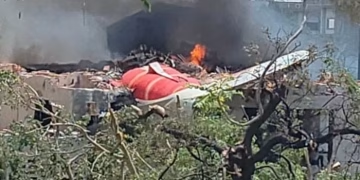Almost a year and a half has passed since the COVID-19 virus was first detected in December 2019, killing more than 3.3 million people worldwide. As the cases spike and decline, with nations going into and coming out of lockdowns, a clear divide has emerged between those who can afford to acknowledge the threat posed by the pandemic and those who cannot.
In Pakistan restrictions on businesses and implementation of SOPs have been met with stern resistance. On one hand, there are those who deny the very existence of the virus and on the other are those who insist the nation has survived through greater tragedies without making the common man suffer as much. It is futile to engage with the first cluster of people for as Mark Twain once wrote: “Never argue with an idiot. They will drag you down to their level and beat you with experience.” The second school of thought, however, does merit some dissection.
The first death from COVID-19 in Pakistan was reported on 18th March 2020. Almost 14 months have passed since then during which over 8,73,000 cases have been reported so far with more than 19,300 lives lost. While no doubt each life matters, the pragmatic demands a comparative approach to ensure proportional measures are put in place.
Deaths from illnesses such as cancer, tuberculosis and AIDS are frequently cited to label COVID19 as the rich man’s problem and justify thwarting restrictions put in place by the government. It seems the constant itch to criticize has consumed the pragmatist’s rationality when they insist on comparing apples to oranges.
Indeed cancer is one of the world’s most excruciating illnesses. According to data gathered by the Global Cancer Observatory, Pakistan registered 1,78,388 new cases in 2020 and 1,17,149 deaths due to cancer- almost six times the number of Pakistanis killed by COVID19. Yet there is one stark difference between the two illnesses: cancer is not contagious. Consequently, imposing restrictions such as limited working hours cannot decrease the number of cancer cases our hospitals receive annually. But what of tuberculosis and AIDS, that is contagious?
As per the World Health Organization, 4,10,000 cases of tuberculosis are registered across Pakistan annually, resulting in 69,000 deaths-more than three times the number of lives taken by the COVID-19 thus far. Although TB is also infectious, it takes prolonged periods of exposure to an infected individual for the disease to be contracted and passed on- unlike the novel coronavirus. Moreover, tuberculosis is caused by bacteria attacking the lungs, and hence can be treated by antibiotics. COVID-19, on the other hand, being a virus, still has no known cure. But then what of AIDS which is both a contagious virus and has no definitive cure?
As per data released by UN AIDS, there were more than 1,90,000 adults and children living in Pakistan with HIV during 2019. The acquired immune deficiency syndrome resulted in 68,000 deaths the same year- again more than three times the number of lives taken by the COVID-19 thus far. However, unlike COVID-19 which is airborne, the human immunodeficiency virus can only be transmitted through bodily fluids-e.g. semen or blood. Consequently, it is futile to insist the government take the same measures for other deadly illnesses like AIDS as it is for COVID19.
There is no denying that those at the bottom end of the financial spectrum have suffered the most as a result of the pandemic. Their salaries have been slashed and savings have taken a hit as prices continue to soar and survival becomes difficult. However, restrictions to curb COVID’s spread have not been imposed at the cost of crippling the low-income classes because the lives of the rich are at risk.
The pandemic is a global issue and calls for a national response. The governments- be it provincial or federal- would not have to keep heightening measures if we as citizens acted more responsibly.
People still throng bazaars with masks covering their chins instead of their noses. Large crowds pray side by side at mosques. Even at vaccination centers, hundreds gather together waiting for the doctors to arrive without maintaining any social distance. Blaming governments and justifying our own reckless behavior has become far too convenient. The choice is not solely between death by starvation or by COVID19. We can choose to survive by taking responsibility for our own actions.


























